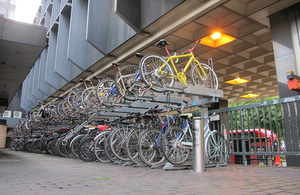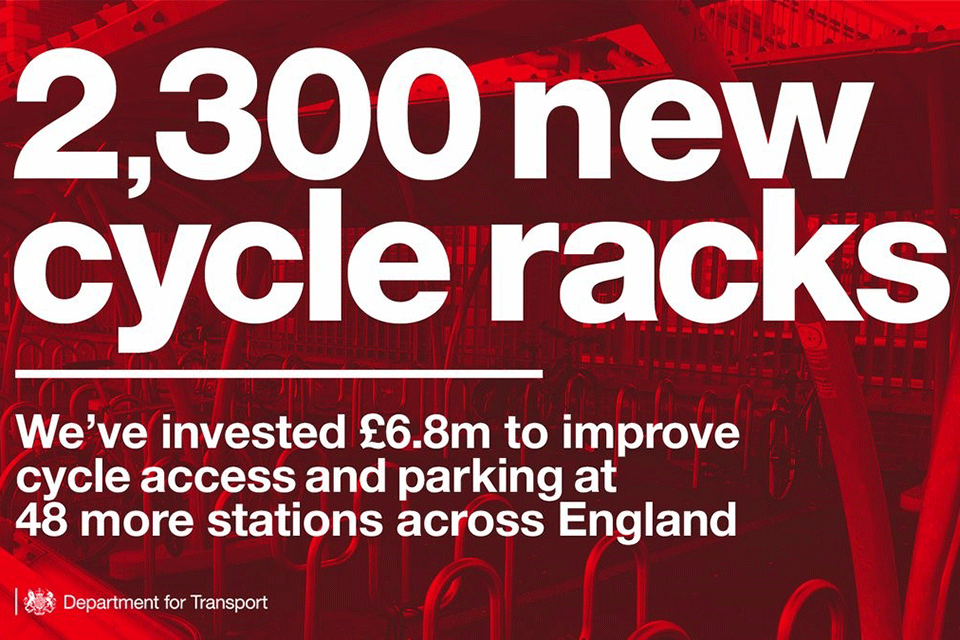£6.8 million boost to help thousands more rail commuters travel by bike
Thousands of new cycle spaces will be added to rail stations around the country thanks to new investment in the Cycle Rail programme.

- passengers at 48 stations will benefit from 2,300 extra cycle spaces, making it easier to commute by bike
- new investment takes total spending in the Cycle Rail programme to over £40 million
- part of a wider government drive to encourage more active travel, following refreshed Cycle to Work guidance published earlier this week
Thousands of rail commuters will be able to make cycling a seamless part of their journeys thanks to a £6.8 million government investment.
Cycling and Walking Minister Michael Ellis has today (14 June 2019) announced an extra 2,300 cycle spaces to be built at 48 stations across England, enabling commuters to cycle directly to the station and lock up their bike securely.
The investment is part of the Cycle Rail programme, now been backed by over £40 million from the Department for Transport. It has helped tens of thousands of cyclists to make their journeys to work joined up and sustainable.
Michael Ellis, said:
Cycling to your nearest station and catching a train to work is a great way to keep healthy, reduce emissions and help make our towns and cities vibrant places to live.
But to make this a reality, I know that the right infrastructure needs to be in place. This latest investment will see many more stations become accessible for cyclists, so that greener travel options – whether as part of a longer or shorter journey – become the norm.

The Cycle Rail programme has already tripled the number of cycle parking spaces at more than 500 stations, bringing the total to over 80,000.
This includes the creation of integrated cycle hubs at key railway stations, including at Hove, where 150 additional bike spaces with secure key card access and CCTV have been provided, alongside a cycle maintenance, hire and repair business.
At Preston, cyclist access to the station has been improved by the completion of a cycle path alongside a cycle hub, providing safe parking for more than 200 bikes.
Xavier Brice, CEO for Sustrans, the walking and cycling charity, said:
Walking and cycling should be the easiest way for everyone to get to their local station, making our towns and cities better places to live by reducing congestion and air pollution, and improving our physical and mental health. But it’s not always easy.
Train operators and their partners have come up with a range of schemes that will make it easier for people to get to and from their station under their own power, which we hope will encourage more people to choose cycling and walking as part of their everyday journey.
Phillip Darnton, Chair of the Cycle Rail Working Group, said:
This latest, most welcome grant to the Cycle Rail Working Group continues the Department for Transport’s successful funding programme which, over the last 5 years, has directly led to the number of trips to and from stations by bike more than doubling.
This cost-effective investment really does work.
Today’s announcement includes financial contributions from wider station development projects, including the Chisholm Trail cycle route in Cambridge and 280 additional spaces being provided for ongoing improvement works at Chatham station in Kent.
It coincides with Cycling UK’s national Bike Week, which raises awareness of different cycling options to get as many people as possible on their bikes. As part of the week, the government has already launched the refreshed Cycle to Work scheme, providing employees with a tax exemption to access adapted bikes and e-bikes, making it easier to have a greener commute.
It follows a government push to help people to make more conscious transport choices and understand how these contribute to greenhouse gas emissions.
This includes a commitment to end the sale of new conventional diesel and petrol cars and vans by 2040, investment in hybrid trains, the doubling of investment in cycling and walking since 2010, along with the £2.5 billion Transforming Cities Fund which will develop innovative public transport schemes in some of England’s biggest cities.
News desk enquiries
Media enquiries 0300 7777 878
Switchboard 0300 330 3000